Top Emerging AI Technologies 2025 – Forrester Report
Forrester’s Latest AI News: 2025 AI Tech shift—Generative AI & Innovation reshape business strategy

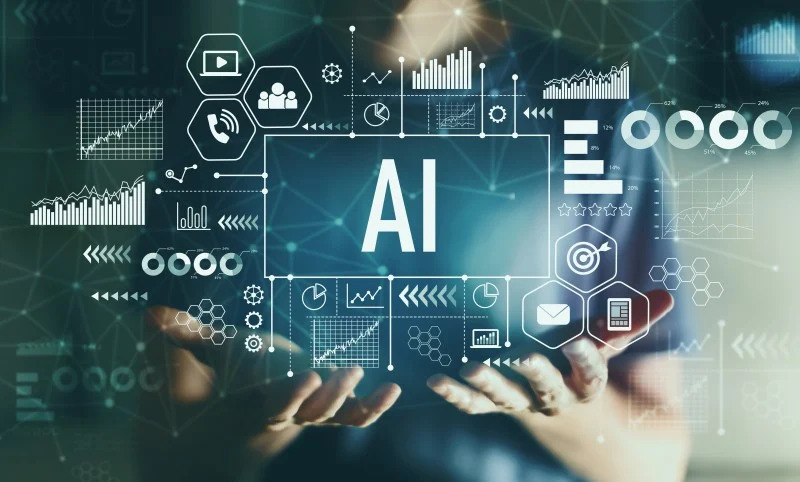
The artificial intelligence landscape is experiencing a fundamental paradigm shift. According to Forrester's comprehensive research released in May 2025, enterprises are rapidly transitioning from AI experimentation phases into strategic deployment and competitive necessity. The research firm's Latest AI News reveals that by the end of 2025, companies will no longer be testing AI Tech capabilities—they'll be racing to keep pace with its acceleration or risk obsolescence.
Forrester Predicts AI Shifts for Asia-Pacific by 2025: A Transformative Year for AI Adoption. Read more here!
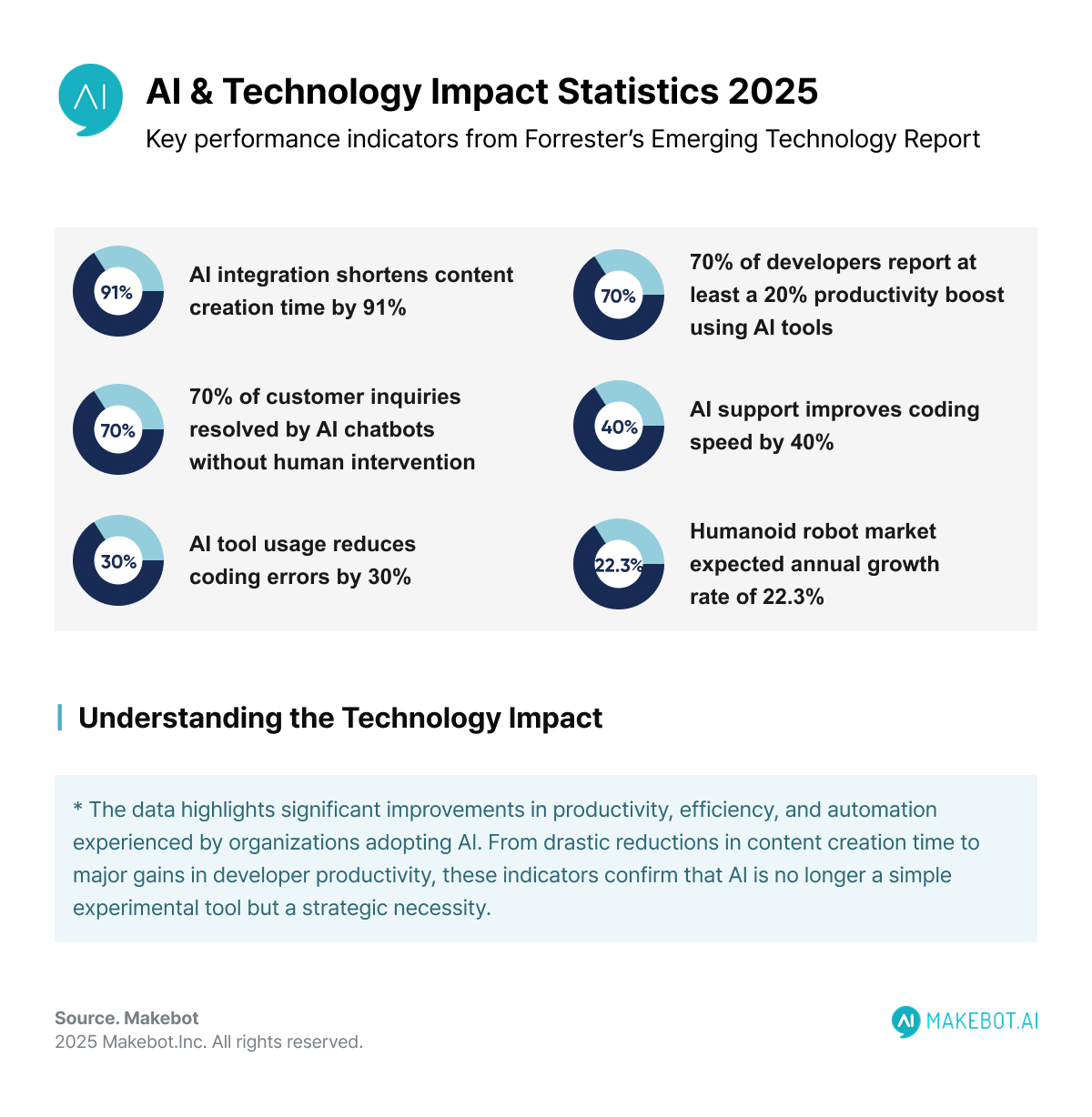
The Strategic Imperative
Forrester's VP of Emerging Tech Portfolio, Brian Hopkins, emphasizes a critical reality: "Tech leaders must be able to identify the right use cases and quantify potential benefits, costs, and risks across multiple horizons."
This represents a maturation in how organizations approach technological adoption, moving beyond proof-of-concepts toward measured, strategic implementation.
The research categorizes emerging technologies across three distinct benefit horizons, providing enterprise leaders with a framework for investment prioritization. This approach acknowledges that while AI in Business applications demand immediate attention, sustainable competitive advantage requires balanced investment across short-term gains and long-term technological foundations.
Deloitte Study Reveals Unprecedented AI Investment Surge: 78% of Organizations Set to Boost Spending. Read here!
Short-Term Technologies
IoT Security
With over 29 billion IoT devices projected by 2030 according to Statista, securing interconnected infrastructure has become non-negotiable. Forrester identifies IoT security as critical for enterprises with high technology integration, particularly as cyberattacks targeting IoT infrastructure surged 280% in 2023 based on IBM's X-Force Threat Intelligence Index.
The technology addresses three fundamental challenges:
- Predictive threat mitigation: Advanced frameworks now incorporate analytics to anticipate security breaches before they occur
- Device lifecycle management: Comprehensive security protocols from deployment through decommissioning
- Network segmentation: Intelligent isolation of compromised devices to prevent lateral movement
Synthetic Data
Synthetic data emerges as a game-changing addition to Forrester's 2025 list, with 42% of firms already implementing it as a privacy-preserving technology. However, its true strategic value extends beyond compliance into performance optimization.
Key applications include:
- Model training enhancement: Creating high-fidelity datasets where real data is limited or unavailable
- Bias mitigation: Ensuring fairness at scale through controlled data generation
- Stress-testing AI behavior: Simulating edge cases and challenging scenarios for robust model development
- Regulatory compliance: Meeting data minimization requirements while maintaining model efficacy
Industries positioned for maximum benefit include financial services, insurance, healthcare, and public sector organizations where regulatory constraints traditionally limit AI model development.
Generative AI for Language
Generative AI for language has transitioned from experimental technology to operational necessity. The symbiotic relationship between language models and other AI Tech creates acceleration effects across the entire technological ecosystem.
Current enterprise applications demonstrate measurable ROI:
- Today’s AI chatbots can resolve up to 70% of incoming queries without human intervention.
- 91% reduction in content creation time when organizations properly integrate AI tools with human oversight.
- Code generated using AI can assist human developers in lowering coding errors by 30% and speeding up the coding process by as much as 40% by reducing manual efforts. A recent survey found that almost 70% of developers who have utilized software development tools powered by AI reported no less than a 20% boost in productivity.
TuringBots
TuringBots represent evolved AI software development tools that extend beyond simple code generation. These systems understand broader software development contexts, providing:
- Contextual bug identification: Predicting potential issues before they manifest
- Optimization suggestions: Recommending performance improvements based on code analysis
- Future needs prediction: Anticipating development requirements based on project trajectory
Mid-Term Technologies
Agentic AI
Agentic AI represents the most significant evolution in AI Innovation, transitioning from reactive systems to proactive, autonomous decision-making entities. Forrester distinguishes this from traditional AI agents through enhanced capabilities:
- Reasoning models: Advanced logical processing for complex problem-solving
- LLMs as critics: Self-evaluating systems that assess and improve their own outputs
- Advanced retrieval methods: Sophisticated information gathering and synthesis capabilities
- Novel model engineering techniques: Breakthrough architectures enabling unprecedented autonomy
However, implementation challenges remain substantial. Thirty percent of enterprises cite "unpredictable outcomes" as adoption barriers, highlighting the need for robust governance frameworks and trust mechanisms.
Generative AI for Visual Content
Visual content generation technology is revolutionizing creative workflows across marketing, advertising, retail, and e-commerce sectors. The technology enables:
- Photorealistic image creation: On-demand visual assets without traditional photography costs
- Dynamic video production: Automated motion graphics and video content generation
- Personalized visual experiences: Customized content delivery based on user preferences
- Rapid prototyping: Instant visualization of concepts and products
Market implications include significant disruption to traditional creative agencies and photography industries, while simultaneously democratizing high-quality visual content creation for smaller enterprises.
Edge Intelligence
Edge intelligence addresses latency and bandwidth limitations by processing data closer to generation sources. Forrester recognizes this technology's critical role in enabling real-time decision-making for applications including:
- Autonomous vehicle navigation systems requiring sub-millisecond response times
- Smart city infrastructure optimizing traffic flow and energy consumption
- Industrial IoT applications managing complex manufacturing processes
- Agricultural monitoring systems enabling precision farming techniques
Quantum Security
Quantum security technologies prepare enterprises for the inevitable arrival of quantum computing threats to traditional encryption methods. Forrester emphasizes the urgency of developing quantum-resistant encryption before quantum computers achieve cryptographic relevance.
Implementation priorities include:
- Post-quantum cryptography: Developing encryption methods resilient to quantum attacks
- Quantum key distribution: Secure communication protocols leveraging quantum mechanics
- Hybrid security frameworks: Transitional architectures bridging classical and quantum security
Long-Term Technology
Humanoid Robots: Physical AI Embodiment
Humanoid robots make their debut on Forrester's top 10 list, driven by convergent technological advances:
- Component cost reduction: Manufacturing expenses decreasing by 15-20% annually
- Robotic dexterity improvements: Advanced manipulation capabilities approaching human-level precision
- Language AI integration: Natural communication interfaces enabling seamless human-robot interaction
Forrester projects the global humanoid robot market will achieve 22.3% CAGR, reaching $6.3 billion by 2030. Applications span multiple industries:
- Manufacturing: Precision assembly and quality control tasks
- Healthcare: Elder care assistance and patient support services
- Hospitality: Customer service and facility management
- Security: Patrol and monitoring applications
- Warehousing: Inventory management and logistics optimization
However, significant obstacles remain, including high R&D costs, complex integration requirements, and ethical considerations around job displacement.
Market Dynamics and Investment Implications
Forrester's research reveals critical market indicators:
- Adoption rates: 45% of global enterprises plan to adopt at least three listed technologies by 2025
- Security concerns: 30% cite security risks as primary adoption barriers
- Integration challenges: 25% struggle with legacy system compatibility
- Investment priorities: Organizations balancing immediate ROI with long-term strategic positioning
The research identifies a concerning trend: enterprises rushing implementation risk accumulating "technical debt" that could compromise long-term competitiveness. Strategic leaders must balance speed with sustainability.
Industry-Specific Applications and Opportunities
Financial Services
Synthetic data enables compliance-friendly AI model training while agentic AI automates complex financial analysis and risk assessment processes. IoT security protects connected payment systems and branch operations.
Healthcare
Edge intelligence enables real-time patient monitoring, while synthetic data addresses privacy constraints in medical AI research. Humanoid robots show promise for elder care and patient assistance applications.
Manufacturing
Autonomous mobility transforms supply chain logistics, while humanoid robots enhance production flexibility. IoT security protects connected manufacturing equipment from cyber threats.
Retail and E-commerce
Generative AI for visual content revolutionizes product imagery and marketing materials. Agentic AI personalizes customer experiences and optimizes inventory management.
Strategic Recommendations for Technology Leaders
Forrester Chief Research Officer Sharyn Leaver provides critical guidance: "Enterprises that strategically balance AI Innovation with risk mitigation will be ones that successfully thrive and achieve sustainable growth."
Investment Framework
- Diversified portfolio approach: Balance short-term ROI technologies with long-term strategic investments
- Risk assessment protocols: Evaluate security implications and integration complexity for each technology
- Governance structures: Establish frameworks for managing autonomous AI systems and data privacy
- Talent development: Invest in workforce capabilities to support emerging technology adoption
Implementation Priorities
- Foundation-first approach: Establish robust IoT security and synthetic data capabilities before advancing to agentic AI
- Pilot program methodology: Test emerging technologies in controlled environments before full deployment
- Cross-functional collaboration: Align technology investments with business strategy and operational requirements
- Continuous monitoring: Implement feedback mechanisms to assess technology performance and business impact
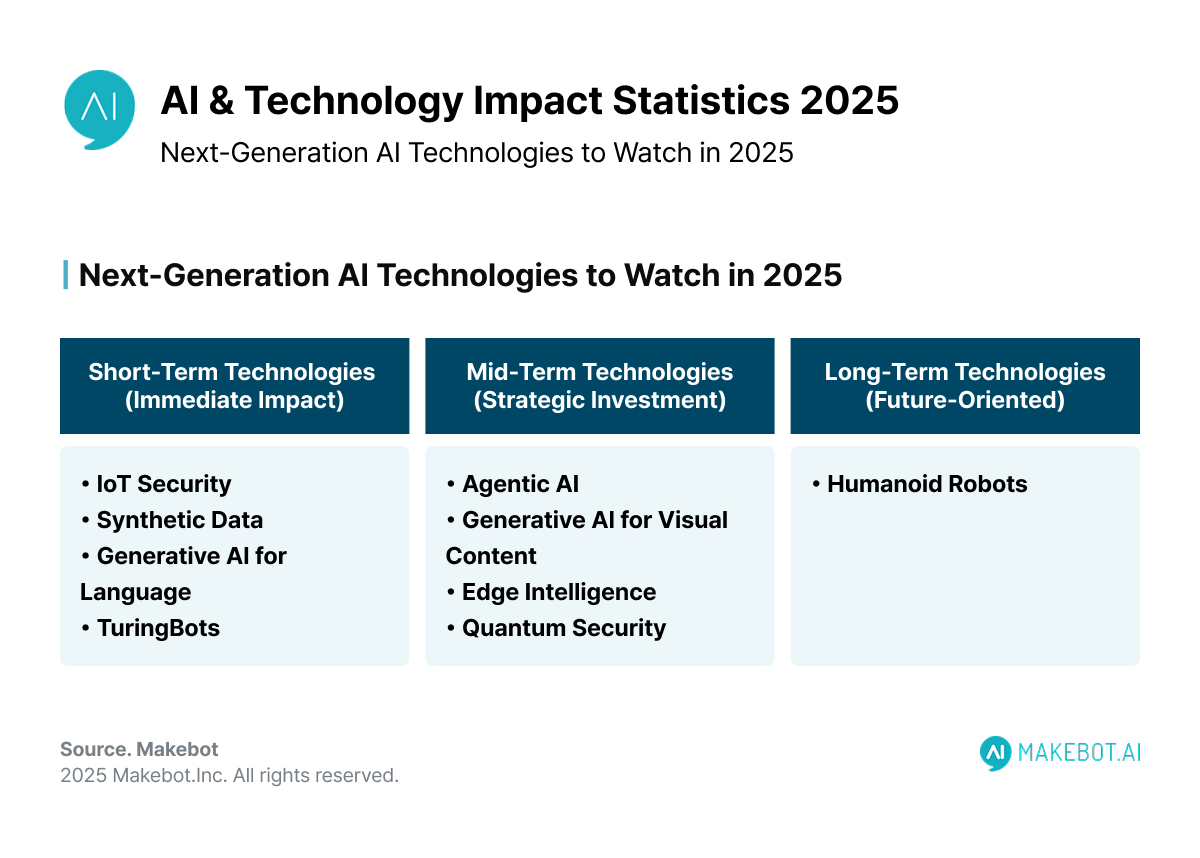
The Competitive Imperative
Forrester's 2025 emerging technologies report makes clear that AI in Business has evolved beyond optional innovation into competitive necessity. Organizations that delay strategic technology adoption risk irrelevance, while those implementing without proper governance frameworks face operational disruption.
The Latest AI News from Forrester underscores a fundamental reality: the question is no longer whether to invest in AI Tech, but how to do so strategically across multiple time horizons while managing associated risks. Success requires balanced investment in immediate-impact technologies like IoT security and synthetic data, while building capabilities for transformational technologies like agentic AI and humanoid robots.
As Generative AI continues its evolution from experimental tool to business-critical infrastructure, enterprise leaders must develop sophisticated technology strategies that balance innovation acceleration with operational stability. The organizations that master this balance will define the next decade of competitive advantage in an increasingly AI-driven economy.
Showcasing Korea’s AI Innovation: Makebot’s HybridRAG Framework Presented at SIGIR 2025 in Italy. More here!
Turn Emerging Tech Into Real Business Results with Makebot
Forrester’s 2025 Emerging Tech Report underscores a clear message: enterprises that move beyond AI experimentation will define the next decade of competitiveness. McKinsey further estimates that Generative AI could unlock up to $4.4 trillion in annual economic value—yet most companies are still struggling to achieve tangible results.
This is where Makebot bridges the gap. We go beyond technology delivery, providing industry-specific LLM agents and end-to-end AI solutions tailored to your business strategy and goals.
Why Choose Makebot?
- Industry-Specific LLM Agents: From healthcare agents used by leading hospitals like Seoul National University Hospital and Gangnam Severance Hospital, to solutions for finance, retail, and the public sector, Makebot delivers customized AI you can trust.
- Ready-to-Deploy AI Solutions: Upgrade or replace your chatbot with BotGrade, enhance customer service with MagicTalk, process complex data with MagicSearch, or automate 24/7 voice consultations through MagicVoice.
- Rapid PoC to Deployment: Quickly transform ideas into proof of concept and scale to production—maximizing adoption speed and ROI.
- Global-Verified Technology: With HybridRAG, presented at SIGIR 2025, Makebot achieved a 26.6% accuracy improvement and up to 90% cost reduction, setting new global benchmarks. Backed by multiple LLM/RAG patents and trusted by over 1,000 enterprises, we deliver stability and proven impact.
Generative AI is no longer just an innovation—it’s a core growth engine. With Makebot, you can move strategically from exploration to execution and turn AI potential into measurable business results.
👉 Start your AI journey today: www.makebot.ai
📩 Contact us at b2b@makebot.ai to discuss how we can help you lead the AI shift.

Studies Reveal Generative AI Enhances Physician-Patient Communication








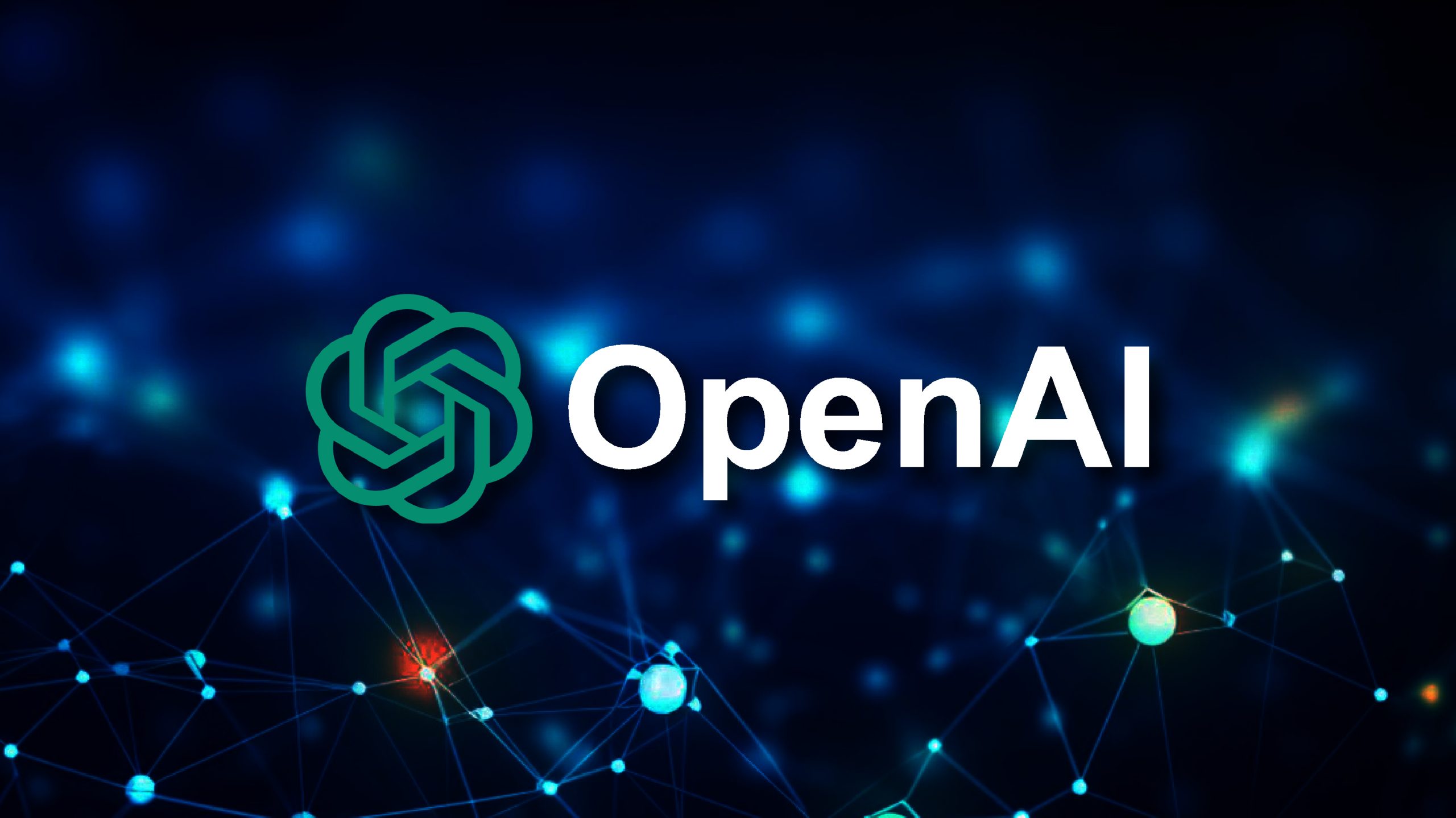



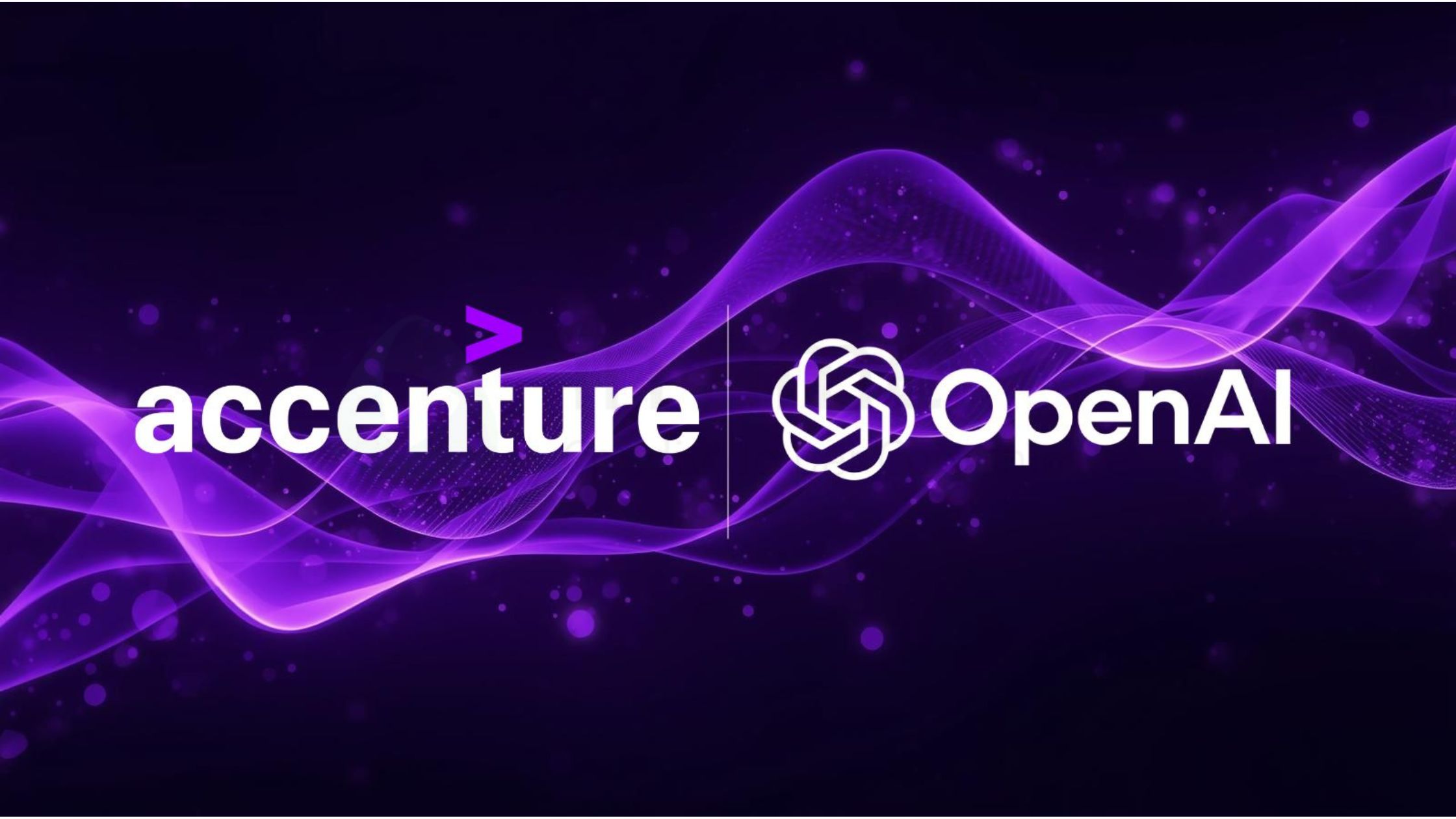
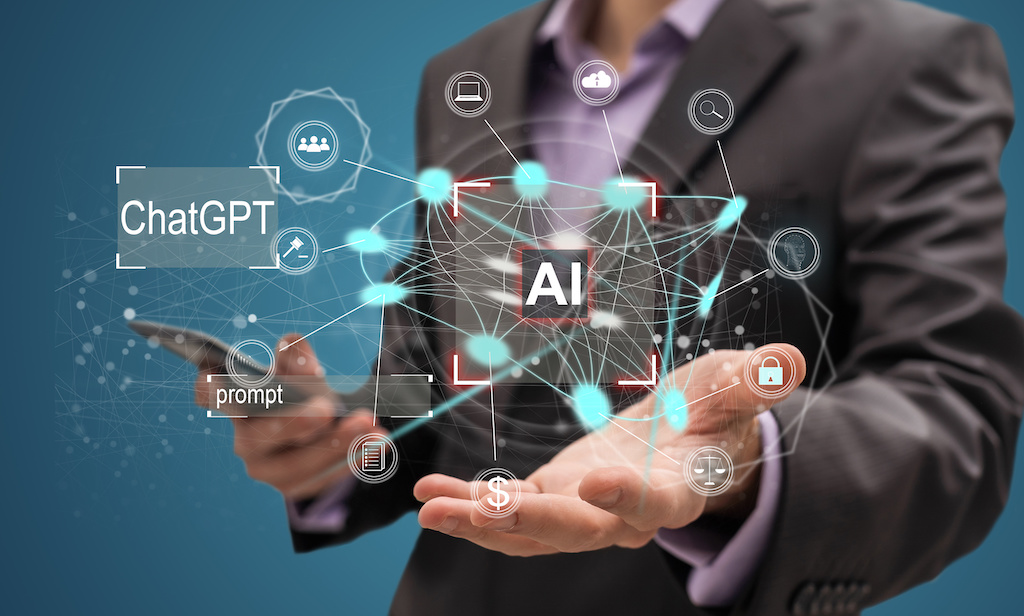


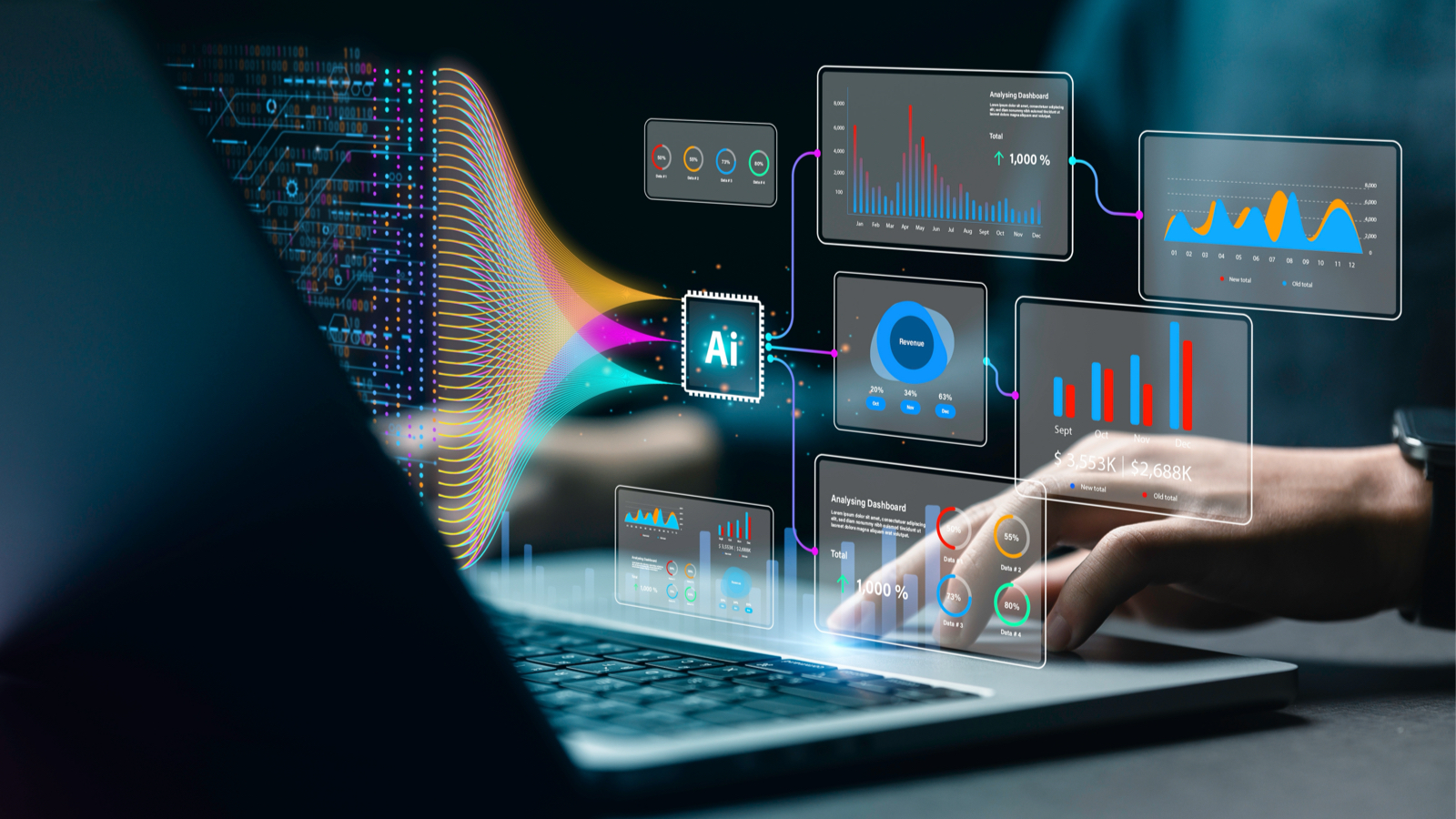






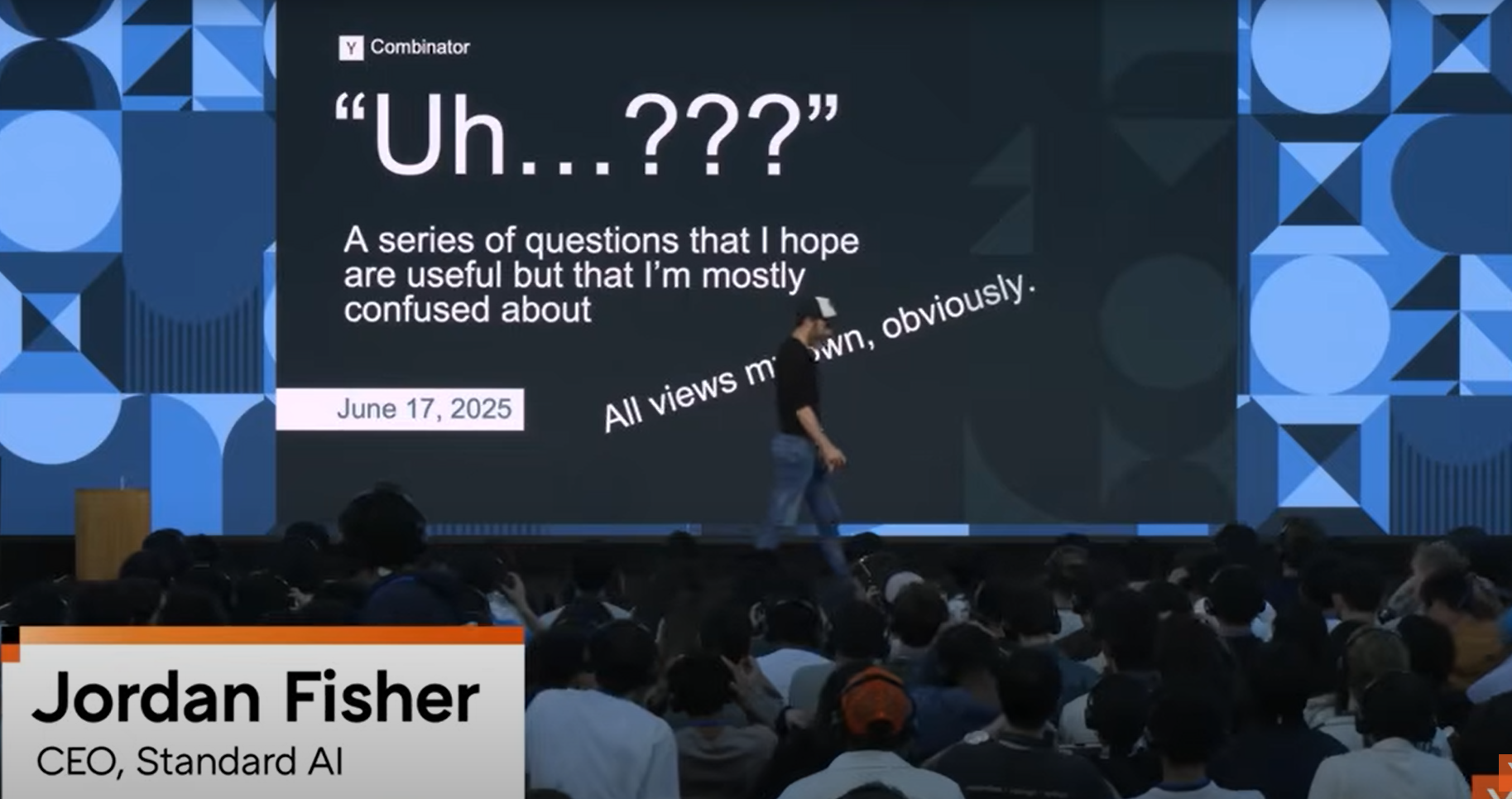



















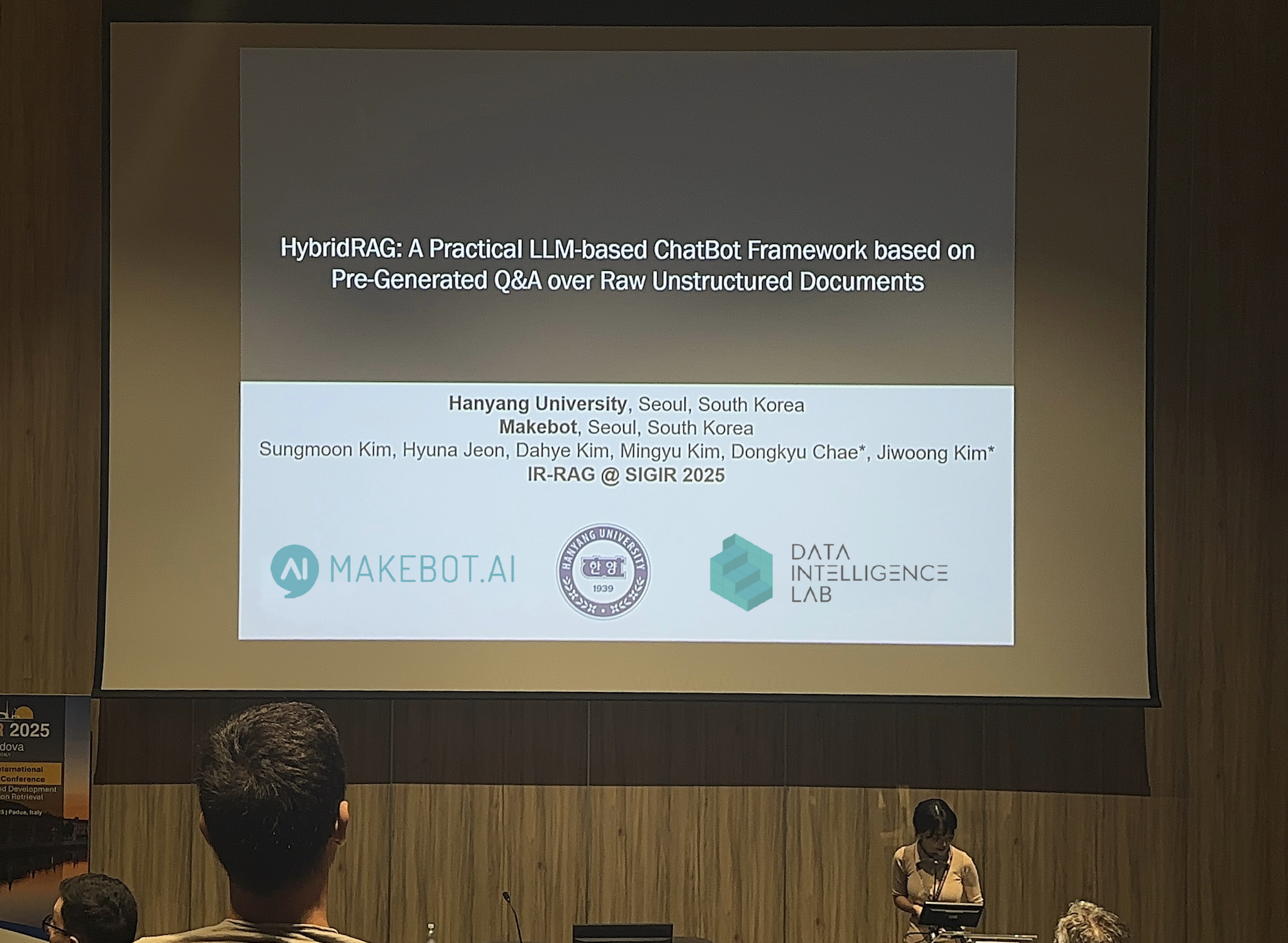









_2.png)


















.jpg)

























